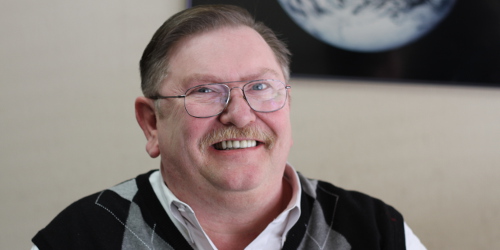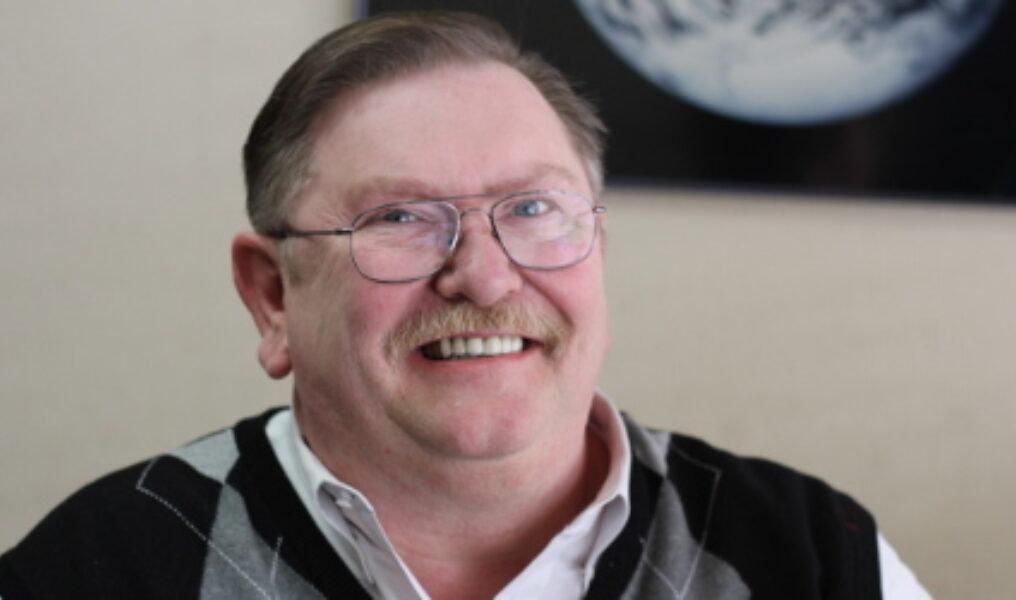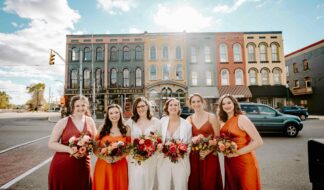
Rev. Ric Beattie
ROYAL OAK — Rev. Ric Beattie, who turns 60 this year, grew up in Lake Orion, Michigan at a time when the area was still semi-rural. By the age of 12 or 13, Beattie knew he was different from other boys his age.
"I liked boys a whole lot more than I liked girls," he recalled. "I struggled to find some role models. Back then one of the few places where I felt safe to go was the library at Oakland University. I would go there and read books. I started to put words to my feelings and learn what homosexuality was."
What he quickly learned was that homosexuality was bad and against his church's teachings.
"I grew up a very devout Roman Catholic kid," said Beattie. "I spent a couple years praying that God would change me because I wanted very much to be pleasing to God… At the age of 17 or 18, I basically said to hell with (God), because not only was I not changed but I was getting gayer all the time. So, you know, I was frustrated."
That frustration led to Beattie walking away from his faith.
"For several years I shifted into the mode that most people call agnostic," he said. "I knew there was something, but I wasn't sure what and I didn't really care. I discovered booze, boys and bars and thought to myself that since I was going to hell anyway, I might as well have some fun."
But the fun all ended when his roommate and longtime friend, Steven Smith, who was also gay, shot and killed himself.
"Steven put a gun to his chest and pulled the trigger, and I happened to be in the room," said Beattie. "Steven died in my arms."
In the midst of making funeral preparations, Beattie received a call from Rev. Nancy Wilson, who identified herself as the pastor of something called Metropolitan Community Church of Detroit. Wilson explained that they were planning to memorialize Smith at their Sunday service and invited Beattie to come say a few words. Beattie was incredulous. A woman pastor? There was no such thing. Nevertheless, he agreed to attend the service. And as it started, something special began to happen.
"I felt an amazing amount of love there," remembered Beattie. "I noticed that there were same gender couples holding hands, and they were having church. There was music and a powerful message, and it was a real church. When it got time for me to say something, I couldn't stop crying. And in that moment, God reclaimed me — or I reclaimed God — and I had a connection with something bigger. Suddenly, the God of my childhood shattered. The hateful, vengeful God in my mind shattered."
Thus began Beattie's journey with MCC. For the next several years, in between a brief move to Los Angeles, Beattie became student clergy and a deacon. Then a friend asked him to visit another church.
"It was called Unity of the Infinite Presence (which later became Church of Today and is now Renaissance Unity)," Beattie, who recalled being immediately impressed, said. "I thought, 'Here's a church that doesn't ask me to check my mind at the door.' There were concepts about God that blew my mind. One of the ideas that really stuck with me from the very first Wednesday night was the idea that Jesus could either be the great exception or the great example. Jack (Boland) said something that night that has haunted me forever since. He said there are at least two Christianities at work in our world. One is a system of beliefs and principles that a man named Jesus of Nazareth lived and taught. And the other is a myth and cult about that man. That was like a lightning bolt in my mind."
For the next few years, Beattie attended MCC on Sunday and Unity on Wednesday night.
"I did that back and forth," he said. "I found that I was going to MCC for the community, because at the time, although there were certainly a number of gay people at Unity, they weren't very out about it. But intellectually, and from a teaching standpoint, Unity resonated with me more strongly than MCC."
Though he had found a spiritual home, there was still turbulence in Beattie's life. He moved back to Los Angeles for a while for work, developed a cocaine addiction, lost his father, moved back to Michigan to take over his father's manufacturing business, ushered it through a growth spurt and then watched helplessly as it failed. But, as he entered recovery, he found he could no longer deny his calling.
"I said, 'OK, God, this thing you've always wanted me to do, I'll do this,'" Beattie said. "So I was ordained. I took a job at Church of Today as its executive administrator working for Marianne Williamson, who was our spiritual leader at the time. Marianne really ignited in me a long held belief that love could change the world. She also allowed the gay community to be very out there and open, which had not been the case with Jack."
Then, in 2004, Beattie had a mild heart attack.
"I began to think seriously, 'If I'm going to make this leap into ministry, I should probably do it,'" he said.
Beattie was invited to speak at Unity Church of Clare, Michigan.
"I went up there to speak a few times and the lady ended up hiring me," said Beattie. "For about 39 weeks it was interesting because I spoke every Sunday. Then I didn't renew my contract because I knew I had to either move to Clare, and it wasn't financially in the cards for me to move there. So I gave up Clare, and about two weeks later, Renaissance Unity called me."
RU asked Beattie if he would take an interim position as director of youth and family ministry. Then, about six weeks later, they asked Beattie to take the position permanently and become a full member of the ministerial team.
"What was intriguing to me was that I'd gotten in touch with the fact that I had a deep yearning to be a dad," Beattie said. "I guess I always had. But for gay men of my generation, that wasn't really an option unless you were hiding out in a marriage. So in response to that deep yearning, I now had 304 young people in our program. So I suddenly had all these kids and it grew me in ways that surprised me, and it was just a wonderful time in my life."
Beattie was eventually moved up to associate minister for the whole church. But still, there was a longing in his heart to do more.
"I've always wanted to be a senior minister," he said. "The difference being that Jim's the principle speaker, and I had some things that I felt called to say. So when the pulpit in Royal Oak became open it shocked me. The board and I had some conversations, but it wasn't coming easy so I kind of let it go."
Then they asked him back to speak again in January and the talks began once more. Now, Beattie will take over as senior minister of the church beginning with this week's Good Friday service.
"One of the things that excites me about coming to Royal Oak is the opportunity to connect deeply to this community," said Beattie. "One of the challenges for Renaissance Unity, because it's so large and has such a huge footprint, is that it's inherently a commuter church. It's hard to get people to come more than once a week. For some people, it was a big drive. So one of the things I'm hoping to do here is connect deeply in this community."
"At Unity we're about inclusiveness, oneness, that we're all reflections of one light," Beattie continued. "We're really building a community here, a neighborhood where people can come together and support each other regardless of who you are or who you love or who you call God. Buddhists are just as welcome here as Catholic folks… I preached a message at Renaissance Unity about four years ago where I said that if we're not willing to do some things to make God's love real, then I don't want to hear about any more. For me, God is a verb and Christianity is not a spectator sport. And the folks at Unity Royal Oak are ready. We're creating something brand new from the ground up."











